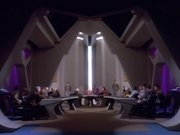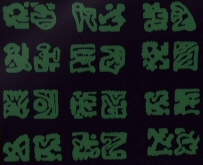Bajoran: Difference between revisions
m (→Religion) |
(alt text) |
||
| Line 1: | Line 1: | ||
{{Expansion needed}} | {{Expansion needed}} | ||
{{Template:ILI| | {{Template:ILI| | ||
image = [[Image:Bajoran.jpg]]| | image = [[Image:Bajoran.jpg|alt=Image of a Bajoran]]| | ||
fedstatus = [[Battle for Bajor|Member as of 2388]]| | fedstatus = [[Battle for Bajor|Member as of 2388]]| | ||
4letter = BJRN| | 4letter = BJRN| | ||
Revision as of 11:49, 12 January 2019
| This article or section is incomplete |
|---|
| This page is missing sections of information that may be filled using 118 canon encounters, or further detail from Memory Alpha. Feel free to edit this page to include new information, using the reference tool (<ref>) where possible. |
| Intelligent Lifeform Index |
|---|
| Bajoran | |
|---|---|

| |
| Four Letter Code | BJRN |
| Federation Status | Member as of 2388 |
| Planet of Origin | Bajor |
| Encountered | TNG: Ensign Ro, (and throughout the DS9 series) |
| T/E Rating | T0/E0 |
| Current Tech Level | K+ |
| List of Named Bajorans | |

| |
Full ILI Gallery • Permitted Species Gallery | |
Home World
- See also: Bajor
History
Bajoran history can be loosely split up into ages. It is worth noting that the Bajoran civilisation is among one of the oldest in the galaxy, dating back some 500,000 years.
In 2370 a xenophobic terrorist movement known as "The Circle" seized control of the Bajoran Provisional government under the leadership of Minister Jaro Essa. Despite the coup eventually being reversed, it had lasting repercussions on Bajor due to the election of Kai Winn, whose involvement with Minister Jaro aided her campaign a great deal. The Circle’s motto was “Bajor for the Bajorans”, reflecting the introverted nature of the Bajoran people, but amplifying it into something twisted and violent. The official political party whose motives were embraced by the Circle was known as the Alliance for Global Unity.
The table below contains significant dates present in Earth-Gregorian format.
Timeline
| Date | Event |
|---|---|
| c. 27,672 B.C. | First Republic (aka First Age). Many artistic masterpieces and cultural treasures were completed during this time. |
| c. 19,672 B.C. | Second Age. During this period of time, the planet fell into a long period of civil conflicts and changes of philosophy and attitude ensued. |
| c. 18,672 B.C. | Second Republic. A period of cultural stability and enlightenment that spanned millennia. During this time the D’jarra system was in use. Considerable scientific and cultural progress was made during this time. |
| 2328 | Cardassians land on Bajor. Ill-prepared for an alien invasion, the Bajorans were easily subdued by the Cardassian people, leading to four decades of occupation. During this timeframe, the Cardassians began to strip-mine Bajor for resources needed to support their own homeworld. Resistance fighters fought the invasionary force using terrorism and guerrilla warfare. Many Bajorans were displaced from their homeworld over the course of the Occupation, mostly ending up in refugee camps. Some joined Starfleet, and a number of Bajorans serve on Starfleet ships at the present time. |
| 2369 | Cardassians withdraw from Bajor. The costs of occupying the planet due to Resistance activity resulted in the recommendation to abandon the planet being approved. Terok Nor, the mining station that orbited the planet, was renamed Deep Space Nine in an agreement with the Federation, who had been invited to assist in the station’s administration. |
| 2369 | Bajoran Wormhole discovered. The discovery of the Alpha Quadrant’s first stable wormhole in the Denorios Belt, terminating in an orbit of the Idran star in the Gamma Quadrant, placed Bajor on the intergalactic political map with a vengeance. |
| 2369 | Kai]] Opaka is left in the Gamma Quadrant after being killed in a shuttle accident and revived by nanotechnology. |
| 2371 | Dominion Cold War. After the eradication of the population of New Bajor, the first Bajoran colony in the Gamma Quadrant, Bajor was drawn into a cold war with the Dominion alongside its Federation allies. Fears that Bajor could be the first victim of an invasion fleet led to the bolstering of Deep Space Nine’s defences and the assignment of the U.S.S. Defiant to the sector. |
| 2373 | The lost city of B’hala is rediscovered by Benjamin Sisko. |
| 2373 | Bajor’s application to become a member of the Federation was accepted, but on the recommendation of the Emissary of the Prophets, Kai Winn withdrew. It was expected that Bajor would re-petition to join soon afterward. |
| 2373 | Dominion War. While the Federation and the Klingon Empire found themselves at war with the Dominion, Bajor, at the behest of the Emissary of the Prophets, Captain Benjamin Sisko, signed a non-aggression treaty to keep them out of the fighting. When Deep Space Nine was commandeered by Dominion forces in 2373, Major Kira Nerys of the Bajoran militia led a secret Resistance cell designed to prevent the Dominion from bringing reinforcements through the wormhole. Despite the failure of the cell, the invasionary fleet would be scuttled by the Prophets themselves after an appeal by the Emissary. |
| 2374 | The Reckoning, a battle between a Prophets and a Pah-wraith, takes place on Deep Space Nine. If the Prophet wins, it will usher in the Golden Age of Bajor. However, the event does not run to a natural conclusion as Kai Winn bombards the location of the battle with chroniton radiation. |
| 2375 | The Dominion is defeated and the war concludes. |
| 2388 | Despite tumultuous events leading up to the final ceremonies, Bajor becomes a member of the Federation. |
Government
The Bajoran world government runs on a democratic system. Ministers are elected into power, as are the First Minister (government leader) and the Kai (Spiritual leader of Bajor).

Initially established as a provisional entity to govern world and interstellar politics, the Bajoran Provisional Government is led by the First Minister. All day-to-day policies regarding Bajor, including the judiciary system and diplomatic assignments are co-ordinated through this organisation. The government is also in direct command of the Bajoran Militia. Ministers are elected through democratic means. The seat of the Government is in the Chamber of Ministers in the Bajor capital.
The Vedek Assembly
The Vedek Assembly holds considerable sway over the planet’s legal and cultural administration. The Kai and the First Minister often consult each other, and while their jurisdiction does not often coincide it is important for both leaders to be of an agreed political standpoint as often as possible. In 2371 Kai Winn became the first leader of the Vedek Assembly to ever serve as First Minister. After the Cardassian Occupation, the Vedek Assembly was the only official organisation with any political standing left on the planet until the inauguration of the Bajoran Provisional Government in 2369.
Description
Physiology
Bajorans physically resemble many of the other humanoid species of the galaxy, bearing a strong resemblance to Terrans and Betazoids. Their most distinguishing feature is a series of around five horizontal ridges on the bridge of the nose. Other key physiological differences include a heart that is mirrored along a horizontal axis rather than the vertical axis seen in the Terran heart, and a gestation period for Bajoran infants of only five months, accompanied by frenetic and uncontrollable sneezing rather than morning sickness.
Psychology
Originally peaceful and introverted, the Bajoran people were somewhat uninterested in contact with other species. Despite one of their solar sailing craft arriving in Cardassian space as a result of tachyon winds near the Denorios Belt, Bajorans made little attempt to explore and colonise worlds further than their own system. They were neither friendly nor unfriendly with other species, instead showing courteous hospitality to those met. However, after 40 years of occupation under the Cardassian Union, the mindset of a large proportion of the Bajoran people has significantly altered. Most tend towards being courteous and hospitable, but there are many whose attitude reflects the violation that their people suffered, leaving them quick to anger, stubborn and impulsive.
Bajorans share an extremely strong bond with their homeworld. It is written in an ancient proverb that “The Land and the People are One.”
Mythology
Society
- See also: Bajoran Militia
The Bajoran judiciary system is not dissimilar to that of the Federation. Representatives are called to present their case to an arbitrator, who considers their evidence and witness depositions before making a ruling according to Bajoran law.
Culture
- See also: Religion, the Pah-wraiths
The Bajoran culture is widely regarded as one of the richest in the galaxy, having had around half a million years to evolve and prosper. Bajorans have two names - the first is the family name, equivalent to a Terran surname. The second is a given name, equivalent to a Terran given name. Bajorans refer to each other by their family name unless permission is given to use their given name as a form of address. For example, a Bajoran named Kenara Jor would be referred to by most people as “Kenara” and by friends and family as “Jor”.
Bajorans enjoy a variety of different foodstuffs, the most popular of which are hasperat (a spicy wrapped dish resembling a Terran burrito), kava juice, and Spring Wine, a blue-hued alcoholic beverage brewed from kava.
Bajoran weddings are spiritual affairs, including readings from scriptures and roles for each member of the spouses' extended family. Wedding receptions tend to be long drawn out parties that can last for days, where neighborhoods are inclined to eat, sleep, dance, and come and go repeatedly until the party calms down on its own. If weddings are scheduled close to other its possible the reception for one will blend into the next.

Bajoran earrings are an indication of their faith in the Prophets. They also served other purposes, for example it has been assumed that they served to signify the D’jarra of the wearer. Many Bajorans have personalised their own earrings, indeed Kira Nerys was able to identify the earring of Li Nalas after it was delivered to Deep Space Nine by the Boslic freighter captain Rionoj early in 2370.
D’jarras
D’jarra refers to a caste system that was in operation on Bajor during the Second Republic. Bajorans held different standings in the community based on their professions, and artists and other culturalists were held in high regard by most citizens. There is evidence to support that earrings were a symbol of D’jarra, although this is not conclusive.
Art & Music
Art is held in high regard in Bajoran culture, and children are taught from as young as four years old. Artists often held a high position within the D’jarra system.
A popular musical instrument on Bajor is the belaklavion, which is not dissimilar to a Terran clarinet in appearance. Its timbre, however is more akin to terran panpipes. The Jalanda Forum was a popular location for musical performances and dramatic entertainment up until the Occupation. Bajoran music is largely based on quartal harmony, giving it a spacious and meditational feel.
Language
The Bajoran language is written in the form of ideographs.
- Ama, Grandmother
- Afa = Grandfather
- Kaifa = Godfather
- Kaimah = Godmother,
- Se'trevalla = Caregiver
- Database of commonly used Bajoran words and phrases
- An analysis of the Bajoran language created by Deranged Nasat
Customs
The Bajorans are less concerned with interring the remains of the deceased than they are with guiding their pagh into the afterlife. A Bajoran death chant can last up to two hours to allow for the recitation of the sacred text. In addition a duranja, or funerial candle, can be lit to act as a memorial for a loved one or friend.
Technology
- See also: Bajoran starships
Starfleet Intelligence Files
References
- Star Trek:The Next Generation (Bajoran Episodes) and Star Trek:Deep Space Nine (Seasons 1-7)
- Memory Alpha (various pages)
- Memory Beta (various pages)
- Star Trek Customizable Card Game (Decipher Inc., 1994-2007)
- Star Trek RPG: Aliens (Decipher Inc., 2003)


